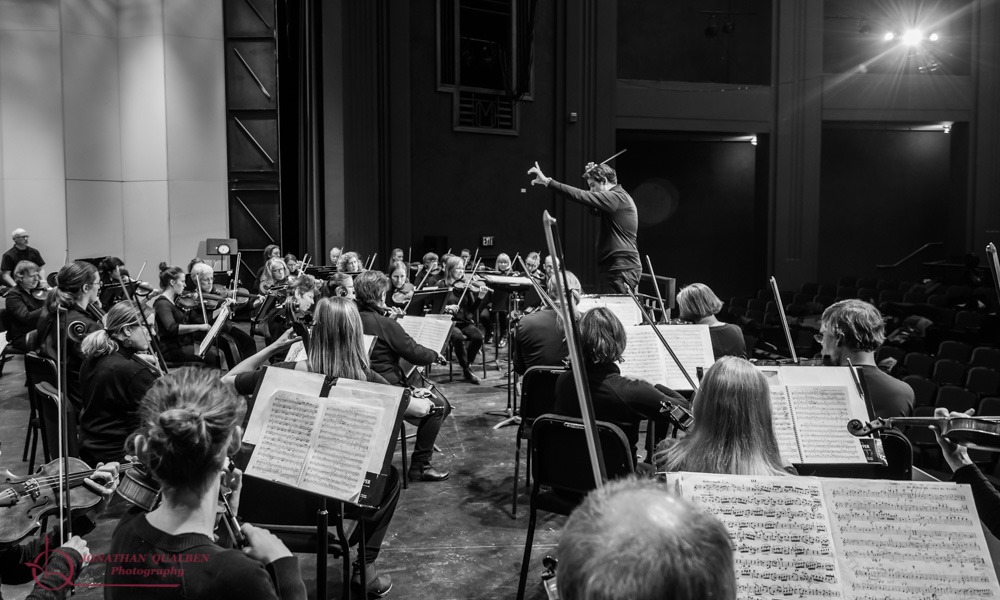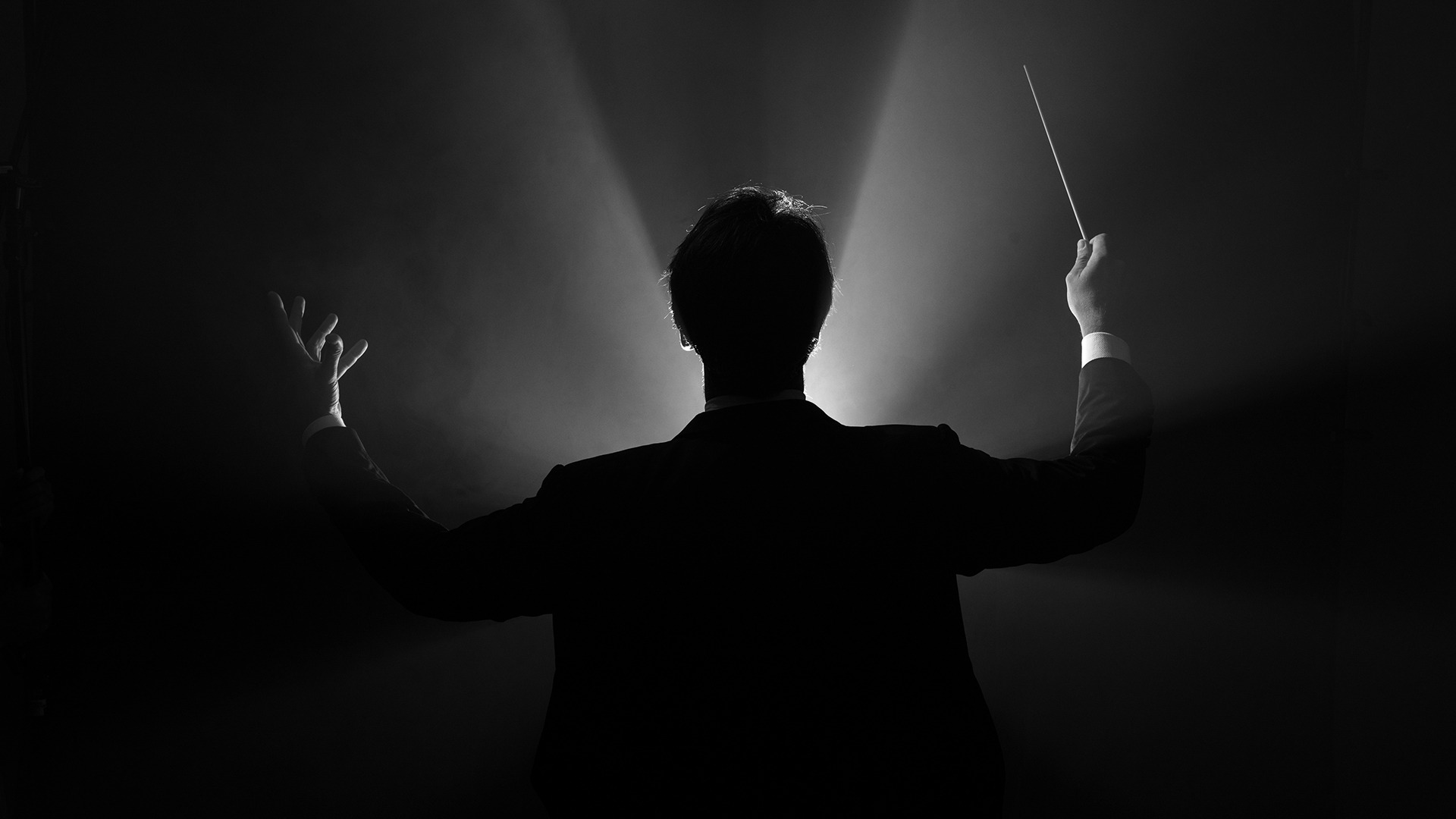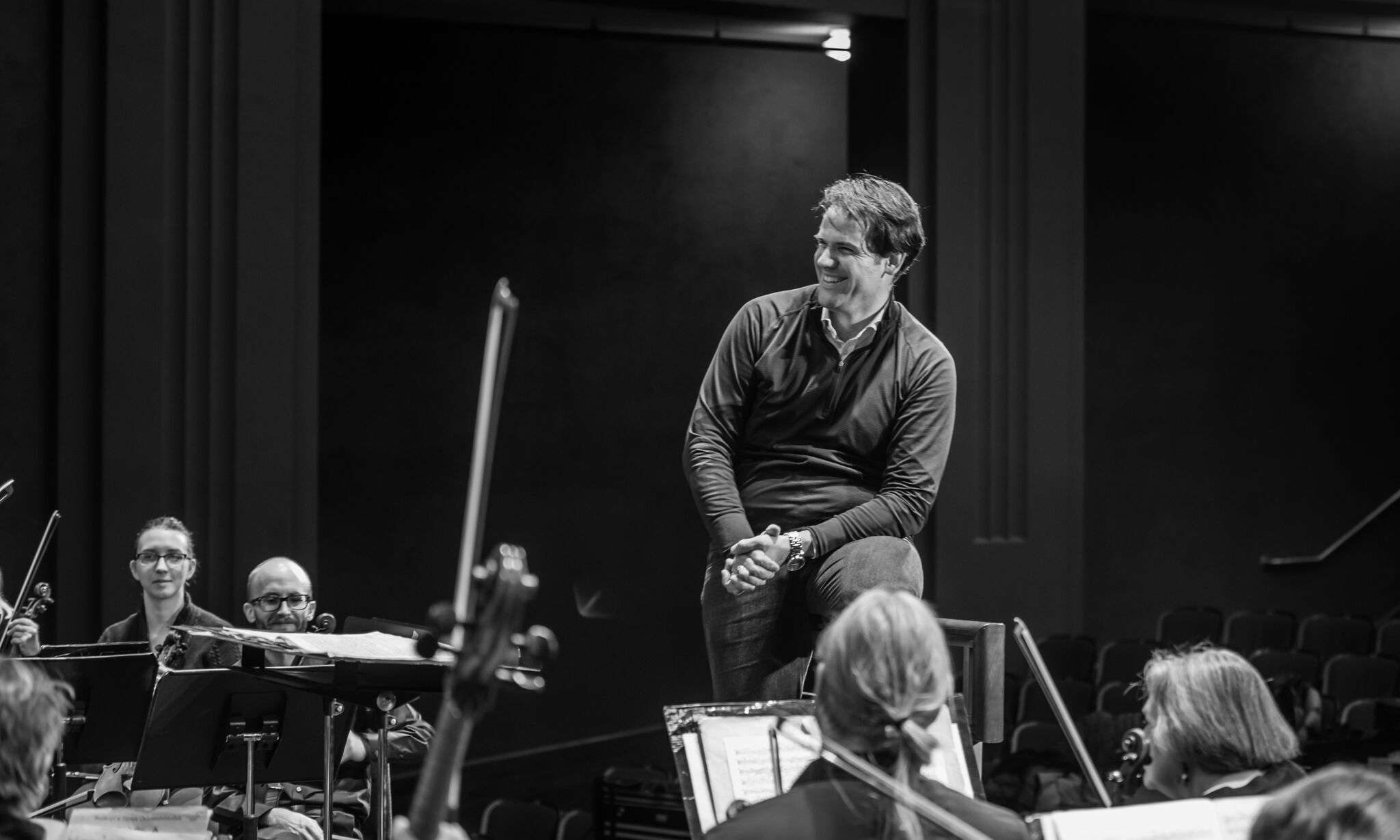
Written by Kathleen Goodwin
The word "musician" is complex, and musicians come in all shapes and sizes. Some have been playing since childhood while others discovered their sound later in life. Some play in clubs and others play in coffee shops. Some sing and some don't sing at all. But all musicians have one thing in common: they create music. Usually, musicians use instruments to create music, but for Darko Butorac, that is not the case. For the past twelve years, Darko has been the conductor of the Missoula Symphony Orchestra, creating music through vision, creativity, and collaboration. “The irony is that I am a musician who makes no sound,” he laughs. “I may not make sound, but I do evoke sound. The evocation of sound is very suggestive, and when you build trust with an orchestra as a team, it is a special environment. It is a form of telepathy.”
When I walked into Black Coffee Roasting Company, the shop was bustling with customers. The garage doors were open and natural light poured in. Sitting by this opening with headphones and a notebook, was Darko. I introduced myself, ordered a coffee, and asked him what he was listening to. I imagined him sitting there in a completely different world than the one he was physically occupying, listening to great concert masters and seeing visions of music notes floating through his mind. Surprisingly though, his answer was the exact opposite of what I expected: “I was actually listening to talk on leadership,” he said. “I love podcasts. I’m a geek... I love learning from other professions and fields and applying that to my work. I find it tremendously inspiring. It’s all about people. If we can find ways to be better and more effective as people, that is fantastic.”

Darko has a deeply passionate curiosity that fuels his study of music. He has worked to master his craft (and he even has his own TED Talk to prove it!). His journey to this point was an unusual one, but all roads to conducting are unusual, he says. His story begins simply enough: a boy moving to America with his family. Growing up in Belgrade, Serbia, Darko moved to the United States to Seattle, Washington, when he was ten with his mother. Darko’s mother, whom he describes as an adventurous person, pursued her Masters in Statistics while Darko learned English. They remained in Seattle due to political turbulence in Yugoslavia and it’s there where Darko first fell in love with music and even got his first taste of conducting an orchestra.
He was 10 when it all began. “I remember in school there as a beginning strings class,” he tells me. “I decided to enroll in it because a friend of mine played the guitar. He could play rock and pop songs, and I thought maybe I could be cool, too.” However, on the first day of the class, Darko walked in and saw no guitar. There was, however, violin, viola, cello or bass. He laughs, “The same friend had played cello, so I decided to play the cello. It was pretty much love at first sight.”
Throughout middle and high school, Darko was a self-proclaimed and proud “music geek.” His first foray in conducting came about in an unusual and nontraditional way, grown simply from his love of music rather than a desire to conduct. “It was a silly thing. I was in my high school orchestra in Seattle, and I really loved Saint-Saëns Third Symphony and really wanted to see if performed,” he explains. “I asked our high school conductor to do it, and he said no because it was too hard. He was right—it was too hard for us, but in my desire to see it happen, I put together an orchestra at lunchtime and made my friends do it, and that is how I first tried out conducting. It was awful,” he laughs. “I didn’t know what I was doing.”
But he was hooked. Conducting was a calling, and music his life’s work and love. Darko began to master the cello and went on to study Cello Performance at the University of Toronto. He went on to get his Masters in Instrumental Conducting at the Indiana University. After graduating, a position opened at Northern Arizona University, and Darko won the job as Director of Orchestras. That same year, he won a job conducting internationally in the Ukraine. Years later in 2006, a job popped up in this small town called Missoula, Montana, and Darko applied.
“I had heard of Missoula, but I didn’t know much about it. I had never been to Montana, but I auditioned and had a great rapport with the orchestra, and I won the job. In retrospect, I was so lucky to have this be my first big position as a music director with a professional ensemble. It’s been a great journey for me personally. I’ve grown a lot, the orchestra has grown together with me, and it is just wonderful.”
Darko explains that conducting is a peculiar profession, and often times, people do not know what to make of his job title. “Most people [don’t think critically about conducting. They] think of the Bugs Bunny cartoon. Ultimately it comes down to working with people. I learn from other professionals and they learn from me."
Conducting is an art form, and it has taken years of studying, practicing, and working with talented musicians for Darko to hone his art. A symphony is more than just a group of musicians playing a song. It is about vision and telling a story. And that direction, that purpose, that finely crafted drama, is the job of the conductor.
“The goal is for us to connect emotionally with a listener. You have to make a drama in music. You manipulate musical elements in performance to basically increase or reduce tension. So, I can increase tension by playing something faster. I can also increase tension by playing something slower. I can decrease tension by playing something more edgy, or I can decrease it by playing a little smoother. I can make the intensity of the shape more or less extreme. When you take all those elements of music—dynamics, articulation, tempo, color, all those things together—you really have a huge palate of color, and as you modify it, you create an oral narrative in the brain of the listener. If the audience members are engaged and listening attentively, I will take them on a journey of increasing tension and release, and when the final climax happens, hopefully, that is the moment they have goosebumps—when they feel something. It’s not just about playing notes on the page well; it’s about how they fit together and how that drama and sound unfolds. That is really important. That is what makes the concert special.”
Conducting, Darko says, is akin to magic.

“It’s such a powerful feeling to move your hands and to have sound come. It is addictive. It’s a form of telepathy, that you can imagine a sound and through your motions, you evoke that sound. It’s a really special feeling. Imagine as if there is a car going by. Imagine if you yourself could slow down the car just by your gesture. That’s the kind of force you’re dealing with. It’s a really cool dynamic. It’s a fascinating field, and how you lead an orchestra is very unusual. You are a leader of 100 people who are experts in their fields. They put their lifetime into becoming experts, and you are leading them. You’re not teaching them how to play music. You are convincing them of a certain vision every time you do a piece. Ultimately, what you all do is strive to have a magical performance that translates to the community. That translates to the people who are in the audience. Those people are inspired. Because they are inspired they bring that to their community, to their work. Everybody wins. That’s the goal. It’s a calling that is very fulfilling because your work does show impact.”
The Missoula Symphony Orchestra’s season consists of 4 Masterworks Pieces, 3 Holiday Pops Shows, a Youth & Family Concert, and the summer favorite, Symphony in the Park. The music for the season is selected a year in advance, but the rehearsal process for each show is compressed into a much shorter time period than one might expect. The music arrives at the offices six weeks before the show and is only distributed to the players three weeks before the first rehearsal. According to Darko, the orchestra has a total of nine days between first rehearsal and the first concert, and in those nine days there are a total of five rehearsals. “It is quite compressed,” Darko explains. “The musicians have time before to prepare and learn the music, and then I come in and we practice together. You get about a total of 11 hours or 12 hours total of rehearsal time as a group.”
Rehearsing, he explains, is a lot less about physically playing the musical score on the page. The musicians are absolute professionals, and they can play their instruments immaculately well. Rehearsals are, instead, more about perfecting the vision and the story, and reconciling the collective visions of the entire group into one.
“You have a conductor’s idea of what a piece should be, and you have an orchestra’s inertia of their collective musical habits and experiences. A lot of them have played this piece before. Maybe they have even played it together before, so your idea and their idea are coming together, and that will not be automatically reconciled. The rehearsal process is about reconciling those two opposing forces.”
The result is a fantastic performance, and performances that, at any given time, almost 10% of Missoula’s population attends. This, Darko says, speaks to the quality of life and the appreciation for the arts and for music in Missoula. He loves each performance, and when asked which of them all is his favorite, he was truly unable to pick.
“I am not saying this as a line, but I get excited for all of them. Our calling is to make the best out of all of them. I can’t come in and be choosey about which ones I am into. We are lucky that the classical music scene has such a large repertoire that every concert can be a smash hit. For pop concerts at holiday time, we are performing music that people really love and identify with. There is a tremendous energy for it. People are excited and playful. It is cold and wintery, but it is a cozy atmosphere and something special to experience. Symphony in the Park has the highest number of exposure to the community. It takes place in Caras Park underneath the tent. We have a huge sound system. 6,000 people come, and it is sponsored by businesses around town who have been a part of the summer concert for more than ten years now. It is a great concert to include everything. There is classical music. There is jazz. There is swing. There are movie soundtracks, pop music and Broadway—so a wide variety. There is something for everybody. It’s a special evening.”

Darko lives in Missoula with his wife and their two-year old son, Bogdan. Darko laughs, “I always joke that I named him after the car wash guy in Breaking Bad, but that is not true. Poor child! His mom chose the name. She is Argentinian. We have quite the international family. We speak three languages in the house at the same time. The little one is a bit confused, but it is great.”
Darko’s son, he claims, is more Missoulian than either himself or his wife. “He is the outdoor kid,” he explains. “I can’t put him inside. He will say “Out! Out! Out!’ Access to nature is such a key to raising children in this town—being cooped up is not the way to go.”
Darko believes that this access to nature is one of the reasons that Missoula is such a creatively oriented town. He believes that nature feeds our community and inspires the creation of art.
“I have to say, we have an above average cultural standard in the city than in most cities our size,” Darko boasts. “Especially considering we are really remote. It is a 6-hour drive to the nearest big city, so considering that, we get a lot of good music acts of course but there is good theater, the authors are incredible and as is the access to independent bookstores. I certainly appreciate the food culture and certainly the coffee culture in Missoula. It is special.”
Darko loves Missoula. He laughs, saying that he has “drank the Kool-Aid.”
“If there is one pet peeve I have with Missoula, it is that there is hard to find people who don’t like it here. And let me explain what I mean there. Everybody is so on the same page it is disconcerting. Everyone loves Missoula. I need a nemesis! Everyone’s too happy!” he laughs. “Of course, I only kid. It is great. When people are happy, they are kind to each other. There is trust in town, and when there is trust, good things happen. That is what makes the community special. Missoula is not too big that people do not know each other. And once you know each other and you know your neighbors and your community members, that results in so many other good things. It is a great upward spiral in the arts and in community in general.”
Darko, who is also the conductor for the Tallahassee Symphony Orchestra in Florida as well as a guest conductor internationally, spends half of his time in Missoula. His profession, he says, is challenging.
“Our home is in Missoula, but the lifestyle is very unusual. I travel for more than half the year. I’ve been lucky. I’ve had opportunities to guest conduct all over the world. It’s not uncommon for music directors in my profession to have one, two, or even three orchestras. There is no choice for where your orchestras are. I don’t know how many days I spent out of the year on planes getting from Missoula to Tallahassee or to Europe. But that is the nature of the beast and it does provide excitement. And the great thing about working with so many orchestras is you take things you learn in Missoula and you bring them somewhere else and from there you encounter new people, new ideas, and you bring those ideas back here. There is a good synergy.”
“The thing I love best about conducting that the focus is on learning music, and learning music is something that I do not see as a job but a privilege. I wake up each morning and I can come here to the café and have a score to study and it’s like ‘Who is it this morning? What genius do I have my coffee with?’ Today is Mozart. Tomorrow is Mahler. Next day Stravinsky. Next day Tchaikovsky. And it’s very fulfilling.”

Darko Butorac will be departing from his roll with the Missoula Symphony Orchestra at the end of the 2019 season to takeover as the conductor for the Asheville Symphony.
Written: 8/6/18